At 2012 Annual Meeting, Honorees Call for Criminal Justice Reform, Diversion
 Speaking to over two hundred fifty lawyers hailing from across the city and legal disciplines this Wednesday, Assistant State’s Attorney Kim Foxx contrasted the juvenile justice system with the adult criminal justice system.
Speaking to over two hundred fifty lawyers hailing from across the city and legal disciplines this Wednesday, Assistant State’s Attorney Kim Foxx contrasted the juvenile justice system with the adult criminal justice system.
ASA Foxx, a ten-year veteran of the Cook County State’s Attorney’s Office and supervisor in the Juvenile Justice Bureau, was accepting the “Commitment to Justice Award” when she told a story about a boy she observed in court a day earlier. A sixteen-year-old charged with a firearm violation, appeared before a judge. Flanked by his lawyer, his father, his DCFS counsel, his counselor, and, yes, his prosecutor, the young man told his judge, “I wish that more of my friends could get group counseling like I did.”
After years of suffering, this young man final received treatment through juvenile justice resources because he was still under the age majority. If he were just two years older, he wouldn’t receive these services.
“Punishment is not the answer,” she said. “Healing is.”
Keynote speaker Randolph Stone seemed to continue this same story in his address. Stone, who directs the Criminal & Juvenile Justice Project at the University of Chicago Law School, described meeting a client recently released from prison. After being arrested at 16, his client was tried as an adult, and served twenty years of a forty-year sentence–much of it in solitary confinement–before stepping off the train that day.
Despite having lived 20 years in state custody, this man, like the twenty or so others accompanying him, had “no skills, no education, and no job,” said Professor Stone, the former Public Defender of Cook County. He named mass incarceration “the fundamental civil rights issue for the 21st century.”
ASA Foxx and Professor Stone’s remarks underscored an annual luncheon celebrating Chicago Appleseed’s 15th Anniversary and a re-upping a commitment to a fair and effective criminal justice system.
Executive Director of Chicago Appleseed and the Chicago Council of Lawyers, Malcolm Rich, announced a “Collaboration for Justice” between the two social justice organizations. “Through collaboration, Chicago Appleseed provides the research, the Council’s board and its membership provide pro bono assistance on our projects, and the groups jointly advocate for solutions,” Rich said.
Click to learn more about the Chicago Appleseed – Chicago Council of Lawyers Collaboration for Justice.

